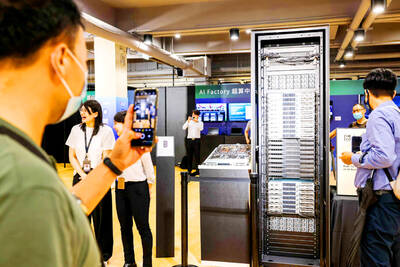China Steel Corp (CSC, 中鋼) yesterday announced that it would lower domestic steel prices for July and August deliveries by 4.19 percent per tonne from next month’s levels to reflect weak demand by its downstream customers, but said it expected prices to stabilize next quarter.
The nation’s biggest steelmaker said it would cut the domestic prices of five major products by an average of NT$1,099 (US$37.97) a tonne, with hot-rolled coil, a benchmark product, down by NT$1,754 per tonne, according to an e-mailed statement from the company.
Yesterday’s announcement was China Steel’s first price cut this year. Last month, the Kaohsiung-based firm announced it would maintain unchanged prices on most of its steel products for delivery next month, after raising prices by an average of 12.1 percent for deliveries last month and this month and an increase of 2.9 percent on March shipments.
“Global economic uncertainties, the impact of Japan’s earthquake [in March] and increased global steel production in the first quarter have pushed down steel prices recently,” CSC said in the statement.
The company said market demand remained unclear because many customers had become more conservative and decided to maintain extremely low inventories because of uncertainties in global political and economic conditions.
However, “global steel prices have shown signs of bottoming out after some steelmakers began cutting production to reflect rising raw material costs in the second quarter,” CSC said.
To match the recent surge in raw material costs, Chinese steel mills led by Baoshan Iron and Steel Co (寶鋼) announced earlier this month that they would raise prices slightly for next month’s shipments. In addition, US steelmakers have been considering increasing export prices by between US$22 and US$55 a tonne, while their Japanese peers are also planning to raise export prices by US$150 a tonne for next month’s deliveries, according to CSC.
“Market demand in the third quarter will certainly be stronger than that in the second quarter,” thanks to re-stocking by customers on expectations of Japan’s post-quake reconstruction and automakers’ resumed production, CSC said.
Even so, the company said it needed to take into consideration downstream customers’ global competitiveness, which has been under pressure because of the New Taiwan dollar’s recent appreciation against the US dollar.
Under the latest pricing adjustments, CSC will not change the prices for steel plates, steel bars and rods, but will cut the price of cold-rolled sheets and coils, which are used in the automotive industry, by NT$1,419 per tonne.
It will also cut the cost of electro-galvanized sheets by NT$1,500, lower electrical sheets by NT$2,600 and drop another NT$1,613 off the price of hot-dipped zinc-galvanized sheets.
CSC shares fell 0.44 percent to close at NT$34.25 on the Taiwan Stock Exchange before the price cuts were announced.
The shares have risen 2.24 percent since the beginning of the year, outperforming a decline of 2.05 percent on the benchmark TAIEX.

LIMITED IMPACT: Investor confidence was likely sustained by its relatively small exposure to the Chinese market, as only less advanced chips are made in Nanjing Taiwan Semiconductor Manufacturing Co (TSMC, 台積電) saw its stock price close steady yesterday in a sign that the loss of the validated end user (VEU) status for its Nanjing, China, fab should have a mild impact on the world’s biggest contract chipmaker financially and technologically. Media reports about the waiver loss sent TSMC down 1.29 percent during the early trading session yesterday, but the stock soon regained strength and ended at NT$1,160, unchanged from Tuesday. Investors’ confidence in TSMC was likely built on its relatively small exposure to the Chinese market, as Chinese customers contributed about 9 percent to TSMC’s revenue last

With this year’s Semicon Taiwan trade show set to kick off on Wednesday, market attention has turned to the mass production of advanced packaging technologies and capacity expansion in Taiwan and the US. With traditional scaling reaching physical limits, heterogeneous integration and packaging technologies have emerged as key solutions. Surging demand for artificial intelligence (AI), high-performance computing (HPC) and high-bandwidth memory (HBM) chips has put technologies such as chip-on-wafer-on-substrate (CoWoS), integrated fan-out (InFO), system on integrated chips (SoIC), 3D IC and fan-out panel-level packaging (FOPLP) at the center of semiconductor innovation, making them a major focus at this year’s trade show, according

DEBUT: The trade show is to feature 17 national pavilions, a new high for the event, including from Canada, Costa Rica, Lithuania, Sweden and Vietnam for the first time The Semicon Taiwan trade show, which opens on Wednesday, is expected to see a new high in the number of exhibitors and visitors from around the world, said its organizer, SEMI, which has described the annual event as the “Olympics of the semiconductor industry.” SEMI, which represents companies in the electronics manufacturing and design supply chain, and touts the annual exhibition as the most influential semiconductor trade show in the world, said more than 1,200 enterprises from 56 countries are to showcase their innovations across more than 4,100 booths, and that the event could attract 100,000 visitors. This year’s event features 17

Hon Hai Precision Industry Co (鴻海精密), which assembles servers for Nvidia Corp, yesterday said that revenue last month rose 10.61 percent year-on-year, driven by strong growth in cloud and networking products amid continued front-loading orders for artificial intelligence (AI) server racks. Consolidated revenue expanded to NT$606.51 billion (US$19.81 billion) last month from NT$548.31 billion a year earlier, marking the highest ever in August, the company said in a statement. On a monthly basis, revenue was down 1.2 percent from NT$613.86 billion. Hon Hai, which is also a major iPhone assembler, added that its electronic components division saw significant revenue growth last month, boosted